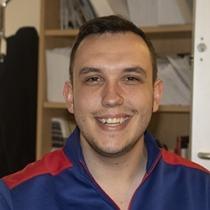
Josh Ingersoll
What is your next adventure?
have accepted a position as space systems engineer at the Aerospace Corporation in Chantilly, Virginia. I will be working in the vehicle development and innovation department doing back-of-the-envelope designs for Department of Defense five-star generals who want us to develop systems for national defense.
What about your next adventure are you most looking forward to?
To be honest, having a 9-to-5 job will be great. As an undergraduate at Tech, school was life, and life was school. As a grad student with a fiancee, I put up a little more of a barrier on my time, but I still answered more emails after midnight than I want to admit.
Did you have any previous co-op, internship, or research experience in this area?
My graduate research has been in optical communications for mega-satellites. That involves using laser to pass information between satellites. You can’t jam a laser, but the thing is, you have to line them up.
As an undergraduate, I did research with Dr. Lightsey setting up the ground station for our CubeSat projects. To learn how to use a ground station, I actually went to the Van Leer Building and pointed Georgia Tech’s satellite dish to the NOAA satellite to get live imagery of North America.
As an intern, I worked with GE Aviation in Cincinnati, working on the GE 9X the summer after my third year as an undergrad. The next summer, I was at NASA Ames, in Silicon Valley, working on their Small Spacecraft Technology State-of-the-Art Report. That’s a document that NASA publishes cataloguing new hardware. It’s used as a reference by the AE Senior Design class, so it was kind of cool that, when I was TA’ing that class, I was able to point them to something that actually had my name on it. The next summer – summer of 2019 – I worked as an Isakowitz Fellow at OneWeb in Cape Canaveral in their business development and third-party sales supporting a DARPA contract.
It was through the Isakowitz Fellowship that I got the job at the Aerospace Corporation, actually. As a part of the Fellowship, we had a reception where we met Elon Musk and Buzz Aldrin, but I also got a chance to meet the head of the Aerospace Corporation, who is also the head of the Isakowitz Fellowship. I went right up to him, with my resume, and told him that I’d heard a lot about the Aerospace Corporation and wanted to work with his company. He gave me the opportunity to interview with his team, and, as a result, I was able to not only work with them, but to choose where I would work.
How did your educational experience at Georgia Tech help you to achieve your goals?
What I’ve said to the students I mentor, and to anyone who asks, is that Tech has continually opened up greater and greater opportunities for me – a snowball effect, really. The single best example came right after I finished my last class as an undergraduate. I was having a beer and planning to bartend for the summer before starting graduate school, when I got an email from Dr. Lightsey. He said he’d just gotten an email from a colleague at NASA Ames, telling him that a summer internship had opened up, and asking him if he knew any qualified students. He asked me if I minded if he sent my name to NASA. I said ‘yes,’ and, 45 minutes later, I had a call from NASA, asking to set up a phone interview the next day. So the next day, I woke up, interviewed with NASA, and at the end of the call, they asked ‘Can you start in two weeks?’
That’s an example of what Tech does. It puts you in the right place at the right time to take advantage of opportunities. And it prepares you well for those opportunities. That internship gave me great experience and great references, which I used to get the Isakowitz Fellowship the next summer. And the Isakowitz Fellowship led to my job at the Aerospace Corporation.
What advice would you give to an underclassman who would like to follow the same path?
First of all know this: no matter who teaches AE 2010, it’s going to kick your butt. That’s true no matter who you are. Thermo Fluid Fundamentals is just hard.
The other thing is, and it sounds cheesy, but it’s true: don’t be afraid to introduce yourself to your professors. If you are doing well, they want to know you. If you are having a hard time, they need to know you – and they can help. I’ve seen this as a graduate student teaching assistant, too: the more I know a student, the better I can help him. Put your professors’ office hours into your schedule. The worst-case scenario is: you will be doing your homework in their office where they can help you. The best-case scenario is that you will establish a relationship with them, and that’s always going to help.